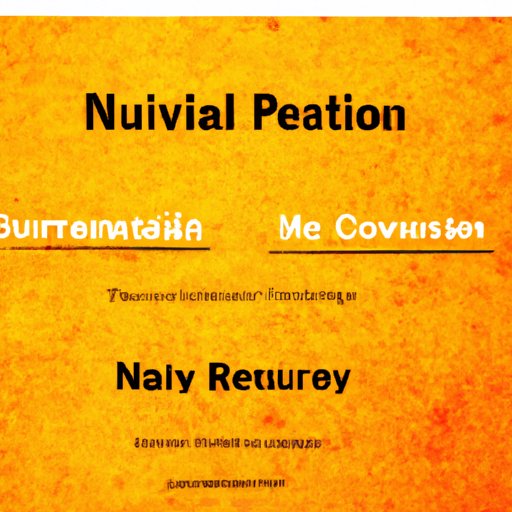Introduction
A culture interview is a method used by organizations to gain insight into their existing company culture. It involves interviewing members of the organization to better understand the values, beliefs, and behaviors that make up the organization’s culture. Culture interviews are becoming increasingly popular as employers seek to understand how their employees feel about the company and its practices.
Conducting a culture interview can provide several benefits for employers. It can help employers identify areas for improvement within the organization, create strategies for fostering a positive work environment, and ensure that the organization’s values are reflected in its day-to-day operations. By gathering data from employees, employers can get a better understanding of what works and what needs to be changed in order to create a successful and productive workplace.
Steps of Culture Interview
Culture interviews typically involve three main steps: preparation, conducting the interview, and analyzing the results. It’s important to plan ahead and have a clear idea of what you want to accomplish with the interview before you begin.
Preparation
The first step in conducting a culture interview is to prepare for it. This includes deciding who will be interviewed, creating a list of questions, and establishing a timeline for completion. You should also consider any special accommodations that may need to be made for certain participants such as language barriers or physical disabilities.
Conducting the Interview
Once you have prepared for the interview, you can begin conducting it. This involves asking questions, listening to responses, and recording the answers. Depending on the size of your organization, you may need to conduct multiple interviews in order to get a comprehensive view of the company culture.
Analyzing the Results
After you have completed the interviews, it is time to analyze the results. This involves looking at the data that was collected and identifying patterns or themes. You should also look for areas where improvements can be made and develop strategies to address any issues that were identified.

Types of Interviews Used in Culture Interview
There are several types of interviews that can be used in a culture interview. These include structured interviews, unstructured interviews, and behavioral interviews. Each type has its own benefits and drawbacks, so it is important to consider which one will best fit the needs of your organization.
Structured Interviews
Structured interviews are those that follow a predetermined set of questions. This type of interview is beneficial because it ensures that all participants are asked the same questions in the same order. However, it can be difficult to customize the questions to the individual and may not allow for open-ended conversations.
Unstructured Interviews
Unstructured interviews involve allowing the conversation to flow more freely. There is no predetermined set of questions, and the interviewer is free to ask whatever questions they think are relevant. This type of interview allows for more open-ended conversations and can provide deeper insights into the company culture. However, it can be more difficult to analyze the results since there is no set structure.
Behavioral Interviews
Behavioral interviews involve asking questions that focus on how the participant has acted in the past. This type of interview can provide insight into how people think and behave in certain situations, which can be useful for understanding the organizational culture. However, it can be difficult to assess the accuracy of the responses since participants may not remember past events accurately.

Questions Asked During a Culture Interview
When conducting a culture interview, it is important to ask the right questions. Questions should focus on the company culture and employee experience. Some examples of questions that can be asked include:
Questions Related to Company Culture
- What do you think sets our company apart from others?
- How would you describe the atmosphere in our office?
- What do you think are the most important values of our company?
- Do you feel like you are encouraged to take initiative at work?
- Do you feel like your opinions are valued at work?
Questions Related to Employee Experience
- How satisfied are you with your job?
- What do you enjoy most about working here?
- What changes would you suggest to improve our company culture?
- Do you feel supported by your coworkers?
- Do you feel like you have opportunities for growth and development?

Analyzing the Results of a Culture Interview
Once the interviews have been conducted and the data has been collected, it is time to analyze the results. This involves understanding the data that was collected, identifying areas of improvement, and developing strategies to address any issues that were identified. It is also important to consider the context in which the data was collected and keep an open mind when interpreting the results.
Understanding the Data Collected
The first step in analyzing the results of a culture interview is to understand the data that was collected. This involves looking at the responses to each question and identifying any patterns or trends. You should also consider any additional information that was provided during the interviews, such as anecdotes or stories.
Identifying Areas of Improvement
Once you have a better understanding of the data, you can begin to identify areas of improvement within the organization. This could include things such as communication, collaboration, leadership, or career development. You should also consider any suggestions that were made during the interviews and whether they could be implemented to improve the company culture.
Developing Strategies to Address Issues
Once you have identified areas of improvement, you can begin to develop strategies to address them. This could include things such as implementing new policies, providing additional training, or offering more support to employees. It is important to consider the resources available and ensure that any strategies developed are realistic and achievable.
Tips for Conducting a Successful Culture Interview
Conducting a culture interview can be a daunting task, but there are some tips that can help ensure success. These include:
Establish Clear Goals
Before conducting the interview, it is important to establish clear goals. This involves identifying the purpose of the interview, who will be interviewed, and what topics will be discussed. Having a clear goal in mind can help ensure that the interview is successful and that the data collected is accurate and relevant.
Focus on Open-ended Questions
When creating the list of questions, it is important to focus on open-ended questions. These types of questions allow the participants to provide more detailed answers and provide deeper insights into the company culture. They also allow for more creative responses and can help identify areas for improvement.
Follow Up with Participants
It is important to follow up with participants after the interview. This can help ensure that their responses were accurately recorded and provide an opportunity to ask additional questions if needed. It is also important to thank the participants for their feedback and let them know how their responses will be used.
Conclusion
Conducting a culture interview is an effective way to gain insight into the organization’s culture. It involves interviewing members of the organization to better understand the values, beliefs, and behaviors that make up the culture. There are several types of interviews that can be used in a culture interview, including structured interviews, unstructured interviews, and behavioral interviews. It is also important to ask the right questions and follow up with participants after the interview. Analyzing the results of a culture interview can help employers identify areas for improvement and develop strategies to address any issues that were identified.
(Note: Is this article not meeting your expectations? Do you have knowledge or insights to share? Unlock new opportunities and expand your reach by joining our authors team. Click Registration to join us and share your expertise with our readers.)
